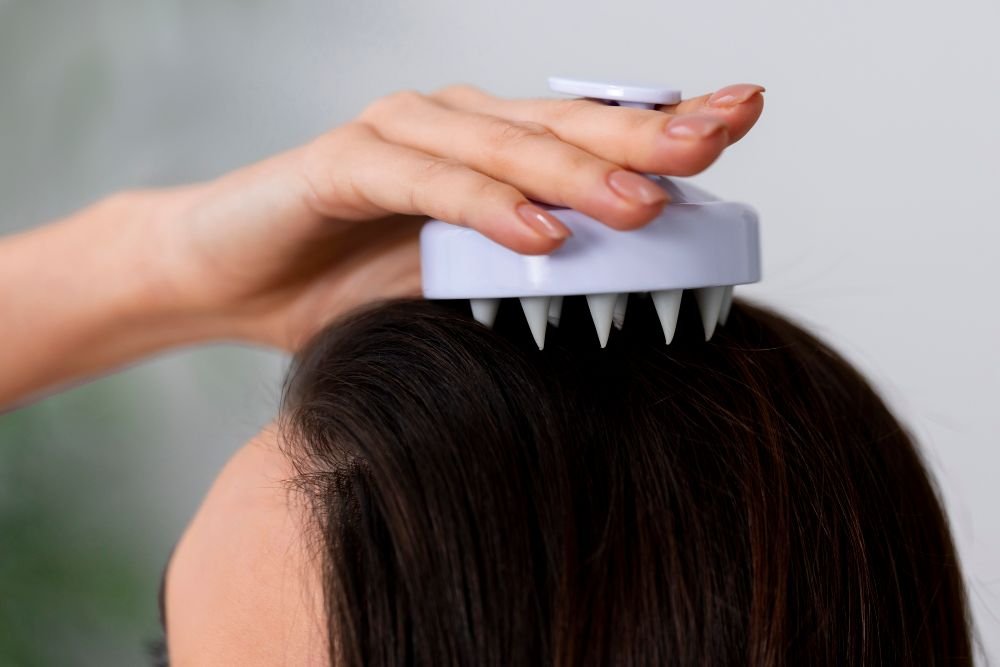Discover the best scalp treatments to prevent fall hair loss and promote healthier, fuller hair.
Hair loss is a common issue that affects millions of people worldwide. Whether it’s due to genetics, hormonal changes, or lifestyle factors, understanding the root causes of hair loss is the first step in combating it.
While it can be distressing to see more strands in your brush or shower drain, it’s crucial to remember that hair loss can often be managed with the right approach.
Table of Contents
Understanding the Causes of Hair Loss: Why It Happens and How to Address It
One of the most prevalent causes of hair loss is genetics. If your parents or grandparents experienced hair thinning or balding, there’s a good chance you might too. This type of hair loss, known as androgenetic alopecia, is linked to the genetic makeup inherited from your family.
Hormonal changes, such as those occurring during pregnancy, menopause, or thyroid disorders, can also wreak havoc on your hair. These hormonal shifts can disrupt the natural hair growth cycle, leading to increased shedding and thinning.
Nutritional deficiencies are another significant factor contributing to hair loss. A diet lacking in essential vitamins and minerals can weaken your hair, making it more prone to breakage and fall. Stress—whether physical or emotional—can also play a major role.
Stress-induced hair loss, known as telogen effluvium, usually occurs a few months after a stressful event. Lastly, scalp conditions like dandruff, psoriasis, or fungal infections can lead to hair loss by damaging the scalp environment where hair follicles thrive.
Discover the Natural Hair Product Trusted by Women for Strong Growth – Try It Today!
Top Scalp Treatments to Prevent Hair Loss: A Comprehensive Overview
When it comes to treating hair loss, targeting the scalp is essential. By focusing on scalp health, you can create an optimal environment for hair growth, reducing hair fall and promoting thicker, healthier strands. Below are some of the most effective scalp treatments that can help you achieve just that.
Minoxidil (Rogaine)
One of the most widely recognized treatments for hair loss is Minoxidil, commonly known by its brand name, Rogaine. This topical treatment has been approved by the FDA for its effectiveness in stimulating hair regrowth.
Minoxidil works by increasing blood flow to the hair follicles, which can prolong the growth phase of the hair cycle.
To use Minoxidil, apply it directly to the areas of your scalp where hair thinning is most noticeable. Consistent application is key, typically twice a day, to see the best results.
It’s important to note that while Minoxidil can be effective, it requires ongoing use to maintain the benefits. If you stop using it, any new hair growth may gradually fall out.
Women Everywhere Are Raving About This Natural Hair Solution – See Why!
Ketoconazole Shampoo: Combatting Dandruff and Scalp Conditions

For those dealing with scalp conditions like dandruff or seborrheic dermatitis, Ketoconazole shampoo can be a game-changer.
This antifungal shampoo not only helps in reducing dandruff but also addresses the inflammation and excess oil production that can lead to hair loss.
When using Ketoconazole shampoo, it’s recommended to lather it into your scalp and let it sit for a few minutes before rinsing. This allows the active ingredients to penetrate the scalp effectively.
Depending on the severity of your scalp condition, you may need to use the shampoo one to two times a week. Over time, you should notice an improvement in your scalp health, which can help reduce hair fall.
Essential Oils: Natural Remedies for Scalp Health and Hair Growth
If you prefer a more natural approach, essential oils like Rosemary, Peppermint, and Lavender offer powerful benefits for your scalp and hair.
These oils have been used for centuries in traditional medicine for their healing properties, and modern research supports their effectiveness in promoting hair growth.
Boost Your Hair’s Growth Naturally – Join the Women Who Swear by This Product!
- Rosemary oil is particularly well-known for its ability to stimulate hair growth by improving circulation to the scalp. It can help prevent hair follicles from being starved of blood supply, which can lead to hair loss.
- Peppermint oil has a refreshing and cooling effect, which can soothe an irritated scalp while also increasing blood flow. This increased circulation can contribute to healthier hair growth.
- Lavender oil is often used for its calming properties, but it also has antimicrobial and anti-inflammatory benefits that can keep your scalp healthy and free of conditions that might cause hair loss.
To use these oils, mix a few drops with a carrier oil such as coconut or jojoba oil. Massage the mixture into your scalp, focusing on areas where hair loss is most evident.
Regular scalp massages with these essential oils can nourish your scalp, strengthen hair follicles, and encourage new growth.
Scalp Massages: A Simple Yet Powerful Technique for Hair Stimulation
Sometimes, the best solutions are the simplest. Regular scalp massages can significantly impact hair health by boosting circulation and stimulating the hair follicles.
This practice not only helps in reducing stress, which is a known contributor to hair loss, but also promotes relaxation, further supporting hair growth.
To perform a scalp massage, use your fingertips to gently massage your scalp in circular motions. Aim to do this for about 5-10 minutes daily.
Not only will this improve blood flow to your scalp, but it also allows you to relax and unwind, which can help in managing stress levels.
Nutritional Supplements: Supporting Hair Health from the Inside Out
What you put into your body is just as important as what you apply to your scalp. Nutritional supplements can play a crucial role in supporting hair health, especially if your diet lacks essential nutrients.
- Biotin, also known as vitamin B7, is a water-soluble vitamin that supports keratin production—a key protein in hair structure. A deficiency in biotin can lead to brittle hair and increased hair fall.
- Vitamin D is essential for healthy hair follicles, and a deficiency can be linked to hair thinning or alopecia. Ensuring you get enough vitamin D, either through sun exposure or supplements, is vital for maintaining healthy hair.
- Iron is crucial for transporting oxygen to hair follicles. Iron deficiency, especially in women, is a common cause of hair loss. Including iron-rich foods in your diet or taking supplements as recommended by your healthcare provider can help in combating hair loss.
Before starting any supplement regimen, it’s always best to consult with a healthcare provider. They can assess your individual needs and recommend the right combination of vitamins and minerals to support your hair health.
Join Thousands of Women Who Have Strengthened Their Hair with This Natural Formula!
Scalp Treatments with Peptides: Innovative Formulations for Hair Regrowth

Another cutting-edge approach to preventing hair loss involves scalp treatments infused with peptides. Peptides are short chains of amino acids that can stimulate the hair growth cycle and strengthen hair follicles.
These innovative treatments are becoming increasingly popular for their effectiveness in promoting thicker, fuller hair.
Peptides work by signaling cells in the scalp to produce more collagen and elastin, which are vital for maintaining a healthy scalp and strong hair follicles. Some peptide-based treatments also contain growth factors that can further enhance hair growth.
To use peptide scalp treatments, follow the product instructions carefully. These treatments often come in the form of serums or lotions that you apply directly to your scalp.
Regular use can lead to visible improvements in hair density and overall scalp health.
Laser Therapy: Harnessing Technology for Hair Growth
For those seeking a more high-tech solution, laser therapy offers a non-invasive way to stimulate hair growth. Low-level laser therapy (LLLT) uses lasers or light-emitting diodes (LEDs) to enhance cellular activity in the hair follicles, promoting hair growth.
Laser therapy works by increasing blood flow to the scalp and improving the efficiency of hair follicle cells. It’s typically available in clinics as a professional treatment, but there are also at-home devices that offer convenience for regular use.
Before starting laser therapy, it’s advisable to consult with a dermatologist. They can provide guidance on the most effective treatment plan and help you decide whether laser therapy is the right option for your specific hair loss concerns.
Lifestyle Tips for Maintaining Healthy Hair: Simple Changes with Big Impact
While scalp treatments play a significant role in preventing hair loss, adopting a healthy lifestyle can further support your hair health.
Making small changes to your daily routine can make a big difference in the strength and vitality of your hair.
- Balanced Diet: A diet rich in fruits, vegetables, lean proteins, and healthy fats provides the nutrients your hair needs to thrive. Foods high in vitamins A, C, and E, as well as omega-3 fatty acids, are particularly beneficial for hair health.
- Hydration: Drinking plenty of water keeps your scalp hydrated and helps maintain the health of your hair. Dehydration can lead to dry, brittle hair that is more prone to breakage and fall.
- Avoid Heat Styling: Heat styling tools like blow dryers, curling irons, and straighteners can damage your hair over time. Limiting their use and always applying a heat protectant when styling can help preserve the integrity of your hair.
- Gentle Hair Care: When washing and brushing your hair, be gentle. Use a mild shampoo and avoid aggressive brushing, which can lead to breakage and hair loss. Opt for a wide-tooth comb to detangle your hair, especially when it’s wet.
By incorporating these lifestyle tips into your routine, you can enhance the effectiveness of your scalp treatments and support overall hair health.
Remember, consistency is key—maintaining these habits over time will lead to long-lasting results.
Conclusion Revitalize Your Hair with the Best Scalp Treatments to Prevent Fall Hair Loss
Preventing hair loss requires a comprehensive approach that addresses both the scalp and overall lifestyle factors.
By understanding the causes of hair loss and implementing effective scalp treatments, you can significantly reduce hair fall and promote healthier, fuller hair. Whether you choose to use Minoxidil, essential oils, or laser therapy, consistency is crucial for achieving the best results.
Additionally, supporting your hair health with a balanced diet, proper hydration, and gentle care will further enhance the effectiveness of your treatments.
Always consult with a healthcare professional before starting any new treatment, especially if you have underlying health concerns.

